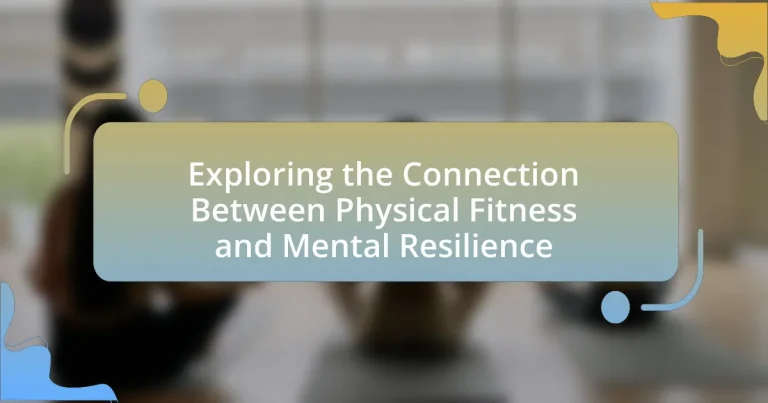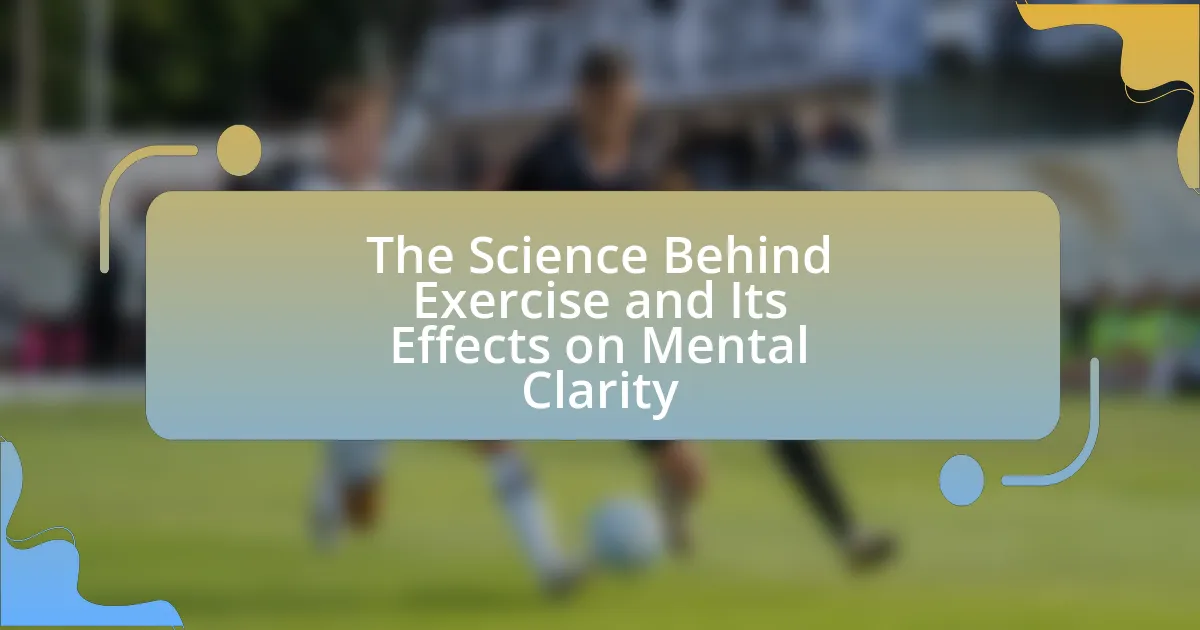The article explores the connection between physical fitness and mental resilience, highlighting how regular exercise enhances mood, reduces stress, and improves cognitive function. It discusses the reciprocal relationship between physical health and mental toughness, emphasizing that physical activity can lead to lower levels of anxiety and depression while fostering self-esteem. Key findings from various studies illustrate the psychological benefits of aerobic exercise, strength training, and mindfulness practices, demonstrating their roles in stress management and emotional regulation. Additionally, the article outlines practical strategies for individuals to improve their physical fitness and mental resilience, including goal-setting and maintaining a consistent exercise routine.
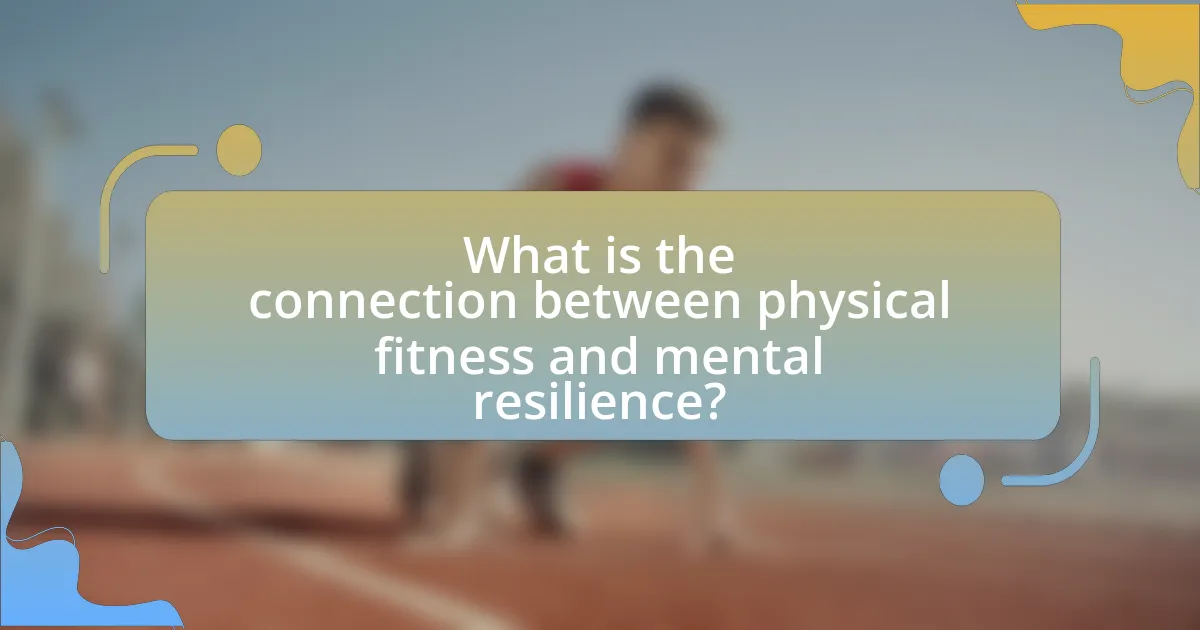
What is the connection between physical fitness and mental resilience?
Physical fitness significantly enhances mental resilience by improving mood, reducing stress, and increasing overall cognitive function. Engaging in regular physical activity releases endorphins, which are chemicals in the brain that act as natural painkillers and mood elevators. Research published in the Journal of Clinical Psychiatry indicates that individuals who maintain a consistent exercise routine report lower levels of anxiety and depression, thereby demonstrating a direct link between physical fitness and improved mental health outcomes. Additionally, studies show that exercise can enhance neuroplasticity, the brain’s ability to adapt and reorganize itself, which is crucial for developing resilience in the face of challenges.
How do physical fitness and mental resilience interact?
Physical fitness and mental resilience interact through a reciprocal relationship where improved physical health enhances mental toughness, and greater mental resilience can motivate individuals to maintain their fitness routines. Engaging in regular physical activity has been shown to release endorphins, which can reduce stress and anxiety, thereby strengthening mental resilience. Research indicates that individuals who exercise regularly report higher levels of self-esteem and lower levels of depression, which are critical components of mental resilience. For instance, a study published in the Journal of Clinical Psychiatry found that aerobic exercise significantly improved mood and cognitive function in participants, demonstrating the direct benefits of physical fitness on mental health.
What are the psychological benefits of regular physical activity?
Regular physical activity significantly enhances psychological well-being by reducing symptoms of anxiety and depression. Engaging in exercise releases endorphins, which are chemicals in the brain that act as natural mood lifters. Research published in the Journal of Clinical Psychiatry indicates that individuals who participate in regular physical activity experience a 20-30% reduction in depressive symptoms. Additionally, consistent exercise improves self-esteem and cognitive function, as evidenced by a study from the University of British Columbia, which found that aerobic exercise increases the size of the hippocampus, a brain area involved in memory and learning. These benefits collectively contribute to improved mental resilience and overall psychological health.
How does exercise influence stress management and coping mechanisms?
Exercise significantly enhances stress management and coping mechanisms by promoting the release of endorphins, which are natural mood lifters. Engaging in physical activity reduces levels of the body’s stress hormones, such as cortisol, and increases the production of neurotransmitters like serotonin and dopamine, which contribute to improved mood and emotional well-being. Research indicates that regular exercise can lead to a 20-30% reduction in anxiety and depression symptoms, as shown in a meta-analysis published in the journal “Health Psychology Review” by Rebar et al. (2015). This physiological response not only helps individuals cope with stress more effectively but also fosters resilience, enabling better management of future stressors.
Why is mental resilience important for overall well-being?
Mental resilience is crucial for overall well-being because it enables individuals to effectively cope with stress, adversity, and challenges. This capacity to adapt and recover from difficult situations directly influences mental health, emotional stability, and life satisfaction. Research indicates that resilient individuals experience lower levels of anxiety and depression, as they possess better problem-solving skills and a more positive outlook on life. For instance, a study published in the Journal of Personality and Social Psychology found that higher resilience is associated with improved psychological well-being and lower rates of mental health disorders. Thus, mental resilience serves as a protective factor that enhances overall well-being by fostering emotional strength and adaptability.
What role does mental resilience play in overcoming challenges?
Mental resilience is crucial in overcoming challenges as it enables individuals to adapt, recover, and thrive in the face of adversity. This psychological strength allows people to maintain focus, manage stress, and persist through difficulties, which is essential for achieving goals and improving overall well-being. Research indicates that individuals with higher mental resilience are better equipped to handle setbacks and are more likely to engage in problem-solving behaviors, leading to successful outcomes. For instance, a study published in the Journal of Personality and Social Psychology found that resilient individuals exhibit greater emotional regulation and coping strategies, which directly contribute to their ability to navigate challenges effectively.
How can mental resilience impact physical health outcomes?
Mental resilience significantly impacts physical health outcomes by enhancing an individual’s ability to cope with stress, which in turn can lead to better overall health. Research indicates that individuals with high mental resilience experience lower levels of stress-related hormones, such as cortisol, which are linked to various health issues, including cardiovascular disease and weakened immune function. A study published in the Journal of Health Psychology found that resilient individuals reported fewer physical health problems and engaged in healthier lifestyle choices, such as regular exercise and balanced nutrition. This correlation suggests that mental resilience not only helps in managing stress but also promotes behaviors that contribute to improved physical health.
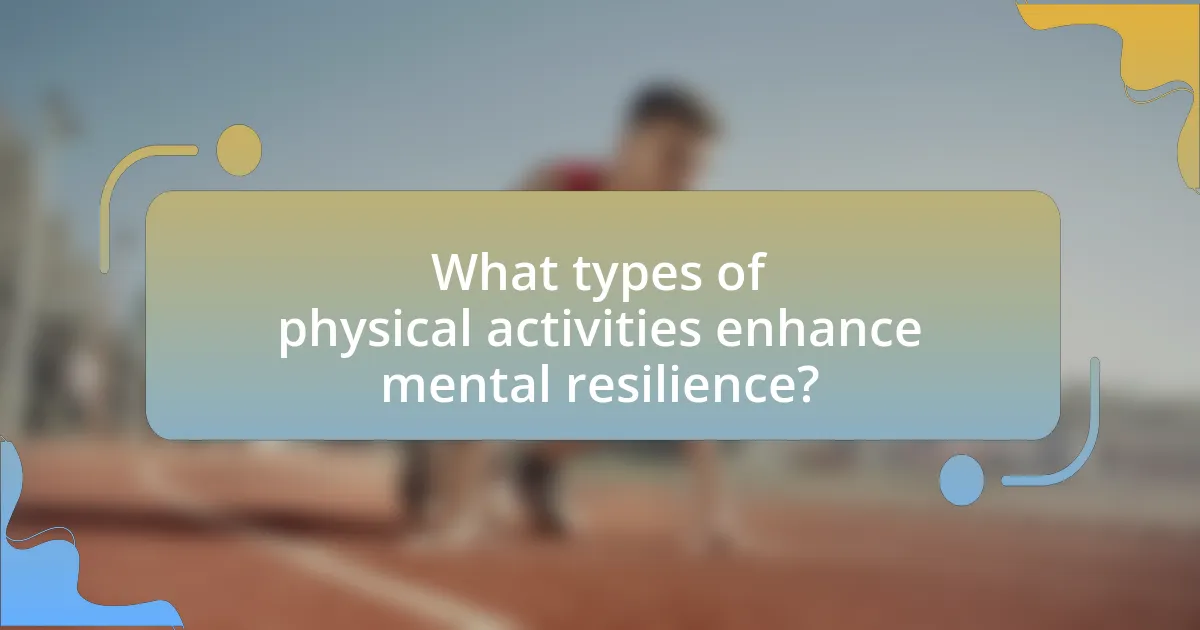
What types of physical activities enhance mental resilience?
Aerobic exercises, strength training, and mindfulness-based physical activities enhance mental resilience. Aerobic exercises, such as running, cycling, and swimming, have been shown to improve mood and reduce anxiety through the release of endorphins and serotonin. Strength training, including weightlifting and resistance exercises, contributes to mental toughness and self-efficacy, as evidenced by studies indicating that individuals who engage in regular strength training report higher levels of confidence and resilience. Mindfulness-based activities, such as yoga and tai chi, promote mental clarity and stress reduction, supported by research that demonstrates their effectiveness in improving emotional regulation and coping strategies.
Which forms of exercise are most effective for building mental strength?
Strength training, high-intensity interval training (HIIT), and yoga are the most effective forms of exercise for building mental strength. Strength training enhances self-discipline and resilience through progressive overload, which requires individuals to push their limits. HIIT promotes mental toughness by demanding focus and perseverance during intense bursts of activity. Yoga fosters mindfulness and stress management, contributing to improved emotional regulation and mental clarity. Research published in the Journal of Clinical Psychology indicates that regular physical activity, particularly strength training and yoga, correlates with reduced anxiety and improved mood, reinforcing the connection between these exercises and mental resilience.
How does aerobic exercise contribute to mental resilience?
Aerobic exercise enhances mental resilience by promoting neuroplasticity and reducing stress levels. Engaging in activities like running or cycling increases the production of brain-derived neurotrophic factor (BDNF), which supports the growth and survival of neurons, thereby improving cognitive function and emotional regulation. Additionally, aerobic exercise lowers cortisol levels, a hormone associated with stress, leading to improved mood and reduced anxiety. Research published in the journal “Psychosomatic Medicine” by Babyak et al. (2000) demonstrated that individuals who participated in regular aerobic exercise reported lower levels of depression and anxiety, further validating the positive impact of aerobic exercise on mental resilience.
What is the impact of strength training on mental health?
Strength training positively impacts mental health by reducing symptoms of anxiety and depression. Research indicates that engaging in regular strength training can lead to improved mood and cognitive function, as it promotes the release of endorphins and other neurotransmitters associated with happiness. A study published in the Journal of Clinical Psychiatry found that individuals who participated in strength training experienced a significant reduction in depressive symptoms compared to those who did not engage in such physical activity. Furthermore, strength training enhances self-esteem and body image, contributing to overall psychological well-being.
What role does mindfulness play in physical fitness and mental resilience?
Mindfulness enhances physical fitness and mental resilience by promoting awareness and focus during exercise, which can lead to improved performance and reduced stress. Research indicates that mindfulness practices, such as meditation and focused breathing, can lower cortisol levels, thereby decreasing stress and anxiety, which are detrimental to both physical health and mental well-being. A study published in the Journal of Clinical Psychology found that participants who engaged in mindfulness training reported significant improvements in their physical activity levels and overall mental health, demonstrating a clear link between mindfulness, fitness, and resilience.
How can yoga and meditation improve mental resilience?
Yoga and meditation enhance mental resilience by promoting emotional regulation and reducing stress. These practices activate the parasympathetic nervous system, leading to decreased levels of cortisol, the stress hormone. Research published in the Journal of Clinical Psychology indicates that individuals who engage in regular yoga and meditation report lower anxiety and improved coping strategies during challenging situations. Furthermore, a study by Goyal et al. (2014) in JAMA Internal Medicine found that mindfulness meditation programs significantly improved psychological well-being, demonstrating a direct link between these practices and enhanced mental resilience.
What are the benefits of combining mindfulness with physical exercise?
Combining mindfulness with physical exercise enhances mental clarity, reduces stress, and improves overall well-being. Mindfulness practices, such as focused breathing and awareness during workouts, can lead to greater engagement in physical activities, resulting in improved performance and enjoyment. Research indicates that individuals who practice mindfulness while exercising report lower levels of anxiety and depression, as evidenced by a study published in the Journal of Clinical Psychology, which found that mindfulness-based interventions significantly reduced symptoms of anxiety in participants. Additionally, integrating mindfulness into exercise routines fosters a deeper connection between mind and body, promoting emotional regulation and resilience.
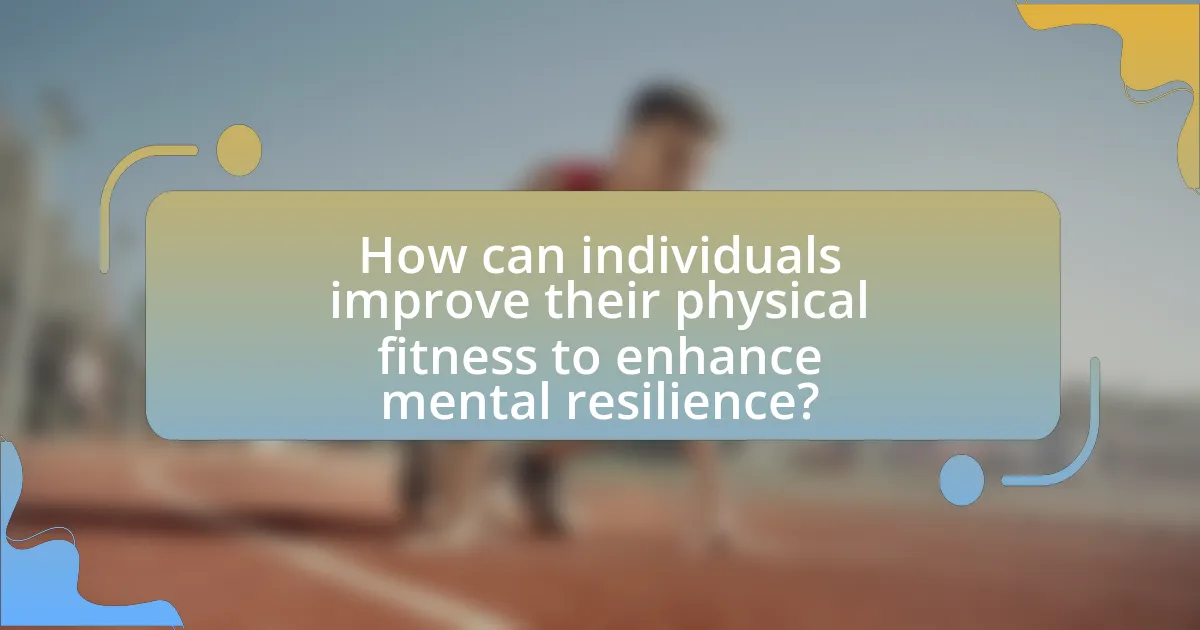
How can individuals improve their physical fitness to enhance mental resilience?
Individuals can improve their physical fitness to enhance mental resilience by engaging in regular aerobic exercise, strength training, and flexibility workouts. Aerobic exercises, such as running or cycling, have been shown to increase the production of endorphins, which can improve mood and reduce stress. A study published in the Journal of Clinical Psychiatry found that individuals who participated in regular physical activity reported lower levels of anxiety and depression, indicating a direct link between physical fitness and mental health. Strength training not only builds muscle but also boosts self-esteem and cognitive function, further contributing to mental resilience. Additionally, incorporating flexibility exercises like yoga can enhance mindfulness and stress management, which are crucial for maintaining mental resilience.
What practical strategies can be implemented for better physical fitness?
To achieve better physical fitness, individuals can implement a combination of regular exercise, balanced nutrition, and adequate rest. Engaging in at least 150 minutes of moderate aerobic activity or 75 minutes of vigorous activity weekly, as recommended by the World Health Organization, significantly improves cardiovascular health and overall fitness levels. Incorporating strength training exercises at least twice a week enhances muscle mass and metabolic rate. Additionally, consuming a diet rich in whole foods, including fruits, vegetables, lean proteins, and whole grains, supports energy levels and recovery. Prioritizing 7-9 hours of quality sleep each night is crucial for muscle repair and mental clarity, further contributing to physical performance. These strategies collectively foster a sustainable approach to fitness, promoting both physical health and mental resilience.
How can setting fitness goals contribute to mental resilience?
Setting fitness goals enhances mental resilience by providing individuals with a structured framework to overcome challenges and build self-discipline. When individuals set specific, measurable, achievable, relevant, and time-bound (SMART) fitness goals, they cultivate a sense of purpose and direction, which can lead to increased motivation and perseverance in the face of obstacles. Research indicates that engaging in regular physical activity, particularly when aligned with personal goals, can improve mood and reduce anxiety, thereby reinforcing mental toughness. For instance, a study published in the Journal of Clinical Psychology found that individuals who set and pursued fitness goals reported higher levels of self-efficacy and resilience, demonstrating the psychological benefits of goal-oriented exercise.
What are the best practices for maintaining a consistent exercise routine?
The best practices for maintaining a consistent exercise routine include setting specific goals, scheduling workouts, tracking progress, and finding enjoyable activities. Setting specific goals, such as exercising three times a week for 30 minutes, provides clear targets to aim for. Scheduling workouts in advance creates a commitment, making it less likely to skip sessions. Tracking progress through journals or apps helps individuals stay motivated by visualizing improvements. Engaging in enjoyable activities increases adherence, as people are more likely to stick with exercises they find fun. Research indicates that individuals who set goals and track their progress are more likely to maintain their exercise routines over time, highlighting the effectiveness of these practices.
What common obstacles do people face in achieving physical fitness and mental resilience?
People commonly face time constraints, lack of motivation, and inadequate resources in achieving physical fitness and mental resilience. Time constraints often stem from busy schedules, making it difficult to prioritize exercise and mental health practices. Lack of motivation can result from unrealistic expectations or previous failures, leading to a cycle of discouragement. Inadequate resources, such as access to gyms or mental health support, further hinder individuals from pursuing their fitness and resilience goals. According to a study published in the Journal of Health Psychology, these obstacles significantly impact individuals’ ability to maintain consistent physical activity and mental wellness practices.
How can individuals overcome barriers to regular exercise?
Individuals can overcome barriers to regular exercise by setting realistic goals, creating a structured routine, and seeking social support. Setting achievable fitness goals helps individuals maintain motivation and track progress, which is supported by research indicating that goal-setting enhances adherence to exercise programs. Establishing a consistent schedule for workouts can reduce decision fatigue and increase the likelihood of participation, as studies show that routine fosters habit formation. Additionally, engaging friends or joining exercise groups provides accountability and encouragement, which has been shown to improve exercise frequency and enjoyment.
What strategies can help maintain motivation for physical fitness?
To maintain motivation for physical fitness, setting specific, achievable goals is essential. Research indicates that individuals who set clear goals are more likely to stay committed to their fitness routines, as these goals provide direction and a sense of purpose. Additionally, tracking progress through apps or journals can enhance motivation by visually demonstrating improvements over time. A study published in the Journal of Sport and Exercise Psychology found that self-monitoring significantly increases adherence to exercise programs. Furthermore, incorporating social support, such as workout partners or fitness communities, can boost accountability and encouragement, making it easier to stay motivated.
What are the key takeaways for enhancing mental resilience through physical fitness?
Engaging in regular physical fitness significantly enhances mental resilience by promoting stress management, improving mood, and fostering a sense of accomplishment. Exercise releases endorphins, which are chemicals in the brain that act as natural painkillers and mood elevators, thereby reducing feelings of anxiety and depression. Studies show that individuals who participate in consistent physical activity report higher levels of self-esteem and lower levels of stress. For instance, a study published in the Journal of Clinical Psychiatry found that aerobic exercise can be as effective as medication for some individuals with depression. Additionally, setting and achieving fitness goals can build confidence and a growth mindset, further contributing to mental resilience.
How can individuals create a balanced fitness plan that supports mental health?
Individuals can create a balanced fitness plan that supports mental health by incorporating a mix of aerobic exercise, strength training, flexibility exercises, and mindfulness practices. Research indicates that aerobic activities, such as running or cycling, can significantly reduce symptoms of anxiety and depression, with a study published in the Journal of Clinical Psychiatry showing that regular aerobic exercise can lead to a 20-30% reduction in depressive symptoms. Strength training has also been linked to improved mood and cognitive function, as evidenced by a meta-analysis in JAMA Psychiatry, which found that resistance training can enhance mental well-being. Additionally, incorporating flexibility exercises like yoga can promote relaxation and stress relief, further supporting mental health. Mindfulness practices, such as meditation or deep-breathing exercises, can enhance the benefits of physical activity by reducing stress and improving emotional regulation. Therefore, a balanced fitness plan that includes these components can effectively support mental health.
What resources are available for further exploration of this connection?
Resources available for further exploration of the connection between physical fitness and mental resilience include academic journals, books, and online courses. Notable academic journals such as the “Journal of Sport and Exercise Psychology” and “Psychology of Sport and Exercise” publish peer-reviewed studies that investigate the psychological benefits of physical activity. Books like “Spark: The Revolutionary New Science of Exercise and the Brain” by John J. Ratey provide insights into how exercise impacts mental health. Additionally, online platforms like Coursera and edX offer courses on psychology and physical fitness that delve into this connection, enhancing understanding through structured learning.
